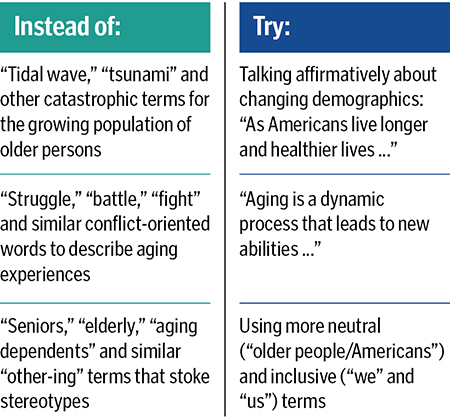I accompanied my daughter and her husband to a toddler's birthday party so I could keep an eye on their son while they mingled with other parents. When we opened the gate to the backyard, the host greeted my grandson and his parents. I was right behind
them and held out my hand, but he had turned his back and was leading them to the party. I am invisible, I realized. I am a professional with interesting ideas, but the dynamics at play seemed tied to the number of my own celebrated birthdays. Ageism.
Ageism is a term coined by Robert Butler, a psychiatrist, gerontologist and founding director of the National Institute on Aging. It is understood to mean discrimination based on negative assumptions about aging.
The World Health Organization (WHO) says, "Ageism refers to the stereotypes (how we think), prejudice (how we feel) and discrimination (how we act) towards others or oneself based on age."1 This bias is pervasive, according to the organization.
It is seen everywhere, from our institutions to our relationships. It is reflected in policies written in ways that mean health and other decisions are made based on age. It is seen in patronizing behavior and self-limiting behavior. Ageism can compound
other disadvantages, including those related to sex, race and disability.
WHO reports that ageism is a serious problem because it impacts "how we view ourselves, can erode solidarity between generations, can devalue or limit our ability to benefit from what younger and older populations can contribute, and can impact our health,
longevity and well-being while also having far-reaching economic consequences."2
With research in this area continuing, taking action today to change society's perceptions of aging is imperative — not only to break down stereotypes around aging, but to help improve overall health outcomes in later life.
AGEISM'S IMPACT ON HEALTH
As noted by WHO, ageism can negatively affect people's health. "Numerous studies have verified that ageism negatively impacts older people in several distinct dimensions, such as memory and cognitive performance,
health and well-being, social isolation and loneliness, job performance, decreased quality of life, and even their will to live," according to a Journal of Personalized Medicine article.3
Reporting for The New York Times on aging, Paula Span recounted how ageism can negatively impact the health of older persons. She referred to the work of psychologist and epidemiologist Becca Levy, PhD, who demonstrated that "ageism results in
more than hurt feelings or even discriminatory behavior. It affects physical and cognitive health and well-being in measurable ways and can take years off one's life."4
Levy's research has shown that ageism is associated with more cardiovascular events, a decline in physical functioning, earlier onset of Alzheimer's disease and more hearing tests. Span reported, "Levy and her colleagues estimate that age discrimination,
negative age stereotypes and negative self-perceptions of aging lead to $63 billion in excess annual spending on common health conditions."5
In her book Breaking the Age Code, Levy cites her 2002 longevity study that found median survival was 7 1/2 years longer for those with the most positive beliefs about aging, compared with those having the most negative attitudes.6
STOPPING AGEISM
Can we fix ageism? WHO recommends three strategies for reducing or eliminating ageism: policy and law to address discrimination and inequality on the basis of age; educational activities to dispel misconceptions and
reduce prejudice by providing accurate information and counterstereotypical examples; and intergenerational interventions, including bringing together people of different ages and generations, to help reduce prejudice and stereotypes.
Changing the public's thinking of aging is the work of the National Center to Reframe Aging, led by the Gerontological Society of America. Its goal is to reframe the understanding of what aging means and how older people contribute to our society. The
center trains facilitators on the research and basics of how to reframe aging. It also has developed study guides and resources for educators, researchers, journalists and others.
The organization's "Quick Start Guide" suggests alternative ways of speaking and writing about aging, for example:7

Some of these language changes have been incorporated into writing guides. The American Geriatrics Society has endorsed bias-free language that was recently included in style manuals for the American Medical Association, the American Psychological Association
and the Associated Press.8
A PERSISTENT ISSUE
So, we should act differently, think differently and speak differently if we are to address ageism. However, it still persists.
On the 2024 presidential campaign trail, former South Carolina governor Nikki Haley, 51, said, "America is not past our prime. It's just that our politicians are past theirs … In the America I see, the permanent politician will finally retire.
We'll have term limits for Congress. And mandatory mental competency tests for politicians over 75 years old."9
CNN host Don Lemon responded, saying "Nikki Haley isn't in her prime. Sorry, when a woman is considered to be in her prime is in her 20s and 30s and maybe 40s."10 He later apologized.
Ageism persists. Oh, my.
JULIE TROCCHIO, BSN, MS, is senior director of community benefit and continuing care for the Catholic Health Association, Washington, D.C.
NOTES
- "Ageing, Ageism," World Health Organization, March 18, 2021, https://www.who.int/news-room/questions-and-answers/item/ageing-ageism.
- "Ageing, Ageism," World Health Organization.
- Júlio Belo Fernandes et al., "Addressing Ageism — Be Active in Aging: Study Protocol," Journal of Personalized Medicine 12, no. 3 (March 2022): 354, https://doi.org/10.3390/jpm12030354.
- Paula Span, "Exploring the Health Effects of Ageism," April 23, 2022, The New York Times, https://www.nytimes.com/2022/04/23/health/ageism-levy-elderly.html.
- Span, "Exploring the Health Effects of Ageism."
- Span, "Exploring the Health Effects of Ageism."
- "Reframing Aging: Quick Start Guide," National Center to Reframe Aging, 2019, https://www.reframingaging.org/Portals/GSA-RA/QuickStartGuide.pdf.
- National Center to Reframe Aging, "Aging in Style: AMA, APA, and AP Guides Adopt Bias-Free Language" news release, https://www.reframingaging.org/News-Events/Aging-in-Style-AMA-APA-and-AP-Guides-Adopt-Bias-Free-Language.
- Kelly Garrity, "Nikki Haley Calls for Competency Tests for Politicians over 75 during Campaign Launch," Politico, February 15, 2023, https://www.politico.com/news/2023/02/15/nikki-haley-competency-tests-00083018.
- Kim Elsesser, "CNN's Don Lemon Says Nikki Haley Is Past Her ‘Prime' at 51—Here's What Research Says," Forbes, February 16, 2023, https://www.forbes.com/sites/kimelsesser/2023/02/16/cnns-don-lemon-says-nikki-haley-is-past-her-prime-at-51-heres-what-research-says/.